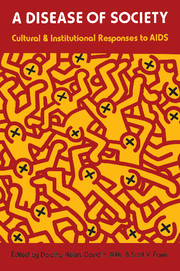Book contents
- Frontmatter
- Contents
- Acknowledgments
- Introduction: A Disease of Society: Cultural and Institutional Responses to AIDS
- PART I CULTURAL IMAGES
- PART II SYSTEMS OF SOCIALIZATION AND CONTROL
- PART III SYSTEMS OF CARING
- PART IV RIGHTS AND RECIPROCITIES
- AIDS and the Future of Reproductive Freedom
- The Poisoned Gift: AIDS and Blood
- AIDS and the Rights of the Individual: Toward a More Sophisticated Understanding of Discrimination
- Notes on Contributors
- Index
AIDS and the Future of Reproductive Freedom
Published online by Cambridge University Press: 20 May 2010
- Frontmatter
- Contents
- Acknowledgments
- Introduction: A Disease of Society: Cultural and Institutional Responses to AIDS
- PART I CULTURAL IMAGES
- PART II SYSTEMS OF SOCIALIZATION AND CONTROL
- PART III SYSTEMS OF CARING
- PART IV RIGHTS AND RECIPROCITIES
- AIDS and the Future of Reproductive Freedom
- The Poisoned Gift: AIDS and Blood
- AIDS and the Rights of the Individual: Toward a More Sophisticated Understanding of Discrimination
- Notes on Contributors
- Index
Summary
Liberal individualism has represented a powerful liberating ideological challenge to both the legal moralism that sought to enforce conventional values by state power and the intrusive and restrictive claims of social orthodoxy. The defense of privacy, so central in that confrontation, has defined realms of social life to be protected from coercion and pressure. No reading of the transformations of the past three decades could fail to recognize the achievements of the liberal challenge (Karst 1980). Certainly, the profound, even if fragile, alteration of the moral and legal standards surrounding sexuality and procreation attest to the stunning victory of those who sought to free individuals from intrusive social and public policies. Now that abortion rights, first secured by the 1973 Supreme Court decision in Roe v. Wade, have become so vulnerable to the political currents crystalized by the Court in its 1989 Webster ruling, the achievements of the liberal ascendency during this era seem all the more striking.
AIDS has represented a challenge to the central impulse of liberal individualism, forcing into the social realm matters that had come to be viewed as of no legitimate public concern; it has revealed the limits of the ideology that had provided the wellspring of cultural and political reform. Pediatric AIDS has contributed yet one more element to the broad encounter with the liberal commitment to the sanctity of reproductive choice, encumbered neither by governmental restrictions nor social pressures.
- Type
- Chapter
- Information
- A Disease of SocietyCultural and Institutional Responses to AIDS, pp. 191 - 215Publisher: Cambridge University PressPrint publication year: 1991
- 5
- Cited by



